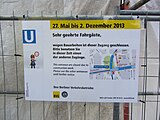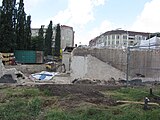Bayerischer Platz (Berlin U-Bahn)
History and architecture

The Schöneberg line between Nollendorfplatz and Innsbrucker Platz, today's U4, was built by the then independent city of Schöneberg to connect it to the "new West" of Berlin (now called City West and the main business centre of West Berlin prior to German reunification). The Bayerischer Platz station was built in 1909/10 to the design of Johannes Kraaz. However, the platform areas of each station on the line were built to a standardised design, presumed to be by Friedrich Gerlach, the Prussian official who was involved in every facet of the development of Schöneberg. The stations resemble those of Alfred Grenander and emulate his use of a distinguishing colour for each station.
Kraaz conceived of the south entrance to the station as a pergola integrated into Fritz Encke's architecture in the square. Since it was the only station on the line to have a 90 m (300 ft) long platform from the start, it was given another entrance at the north end, also in pergola style. This entrance survives largely unchanged today. However, the south entrance, which had been rebuilt after being destroyed in World War II, had to be removed in 1956/57 when Grunewaldstraße was straightened to run through the square.
Already at the time of the station's construction, there were plans to have a line to Neukölln cross at this point. The station was intended to bridge such a future line, which would eventually be built 60 years later.
On 3 February 1945, during World War II, several Allied bombs scored direct hits on the station while 2 trains were halted there, killing 63 people.
North entrance and U4 platform
The north entrance and lobby with their wrought iron railings and pilasters are largely unchanged, the only station entrance on the line to be preserved. The walls are tiled in blue and the stairwells faced with fossil-bearing rock. In the platform area, the original white and blue wall tiles (the heraldic colours of Bavaria) were replaced with slightly brighter colours during reconstruction after the war, but the platform appears almost as it did, and two original kiosks, one with the original tiling, also remain.
U7 station and new south entrance


The lower-level U7 portion of the station, built to Rainer G. Rümmler's design in 1968–70 and opened in 1971, also makes use of the Bavarian colours: the walls are clad in blue fibre cement panels with the station name on a white horizontal stripe, and the support columns are white. The ceiling, resembling skylights in industrial buildings, was designed to avoid dazzling train operators; the fluorescent lights are inset in red piping. The lobbies are decorated in contrasting colours: white, red and turquoise. The design resembles that at Eisenacher Straße, also by Rümmler.
At the same time, the glass-fronted south entrance building erected in the 1950s to replace the demolished original was rebuilt to a modernistic design, also by Rümmler. Colourful art is mounted on the walls inside.
Rebuilding/Renovation 2013
The BVG has done fundamental maintenance to the main entrance building in 2013. On 27 May 2013, the demolition of the main building began. These were completed by 3 December 2013. The new southern entrance building was opened in 2014. During these refurbishment works, the station will be equipped with two additional wheelchair-accessible lifts. The construction for these has started in 2020 and is scheduled to be completed by 2023.
-
Information board
-
Demolition of main entrance building in June/July 2013
-
Demolition of main entrance building in June/July 2013
References
- ^ U-Bahnhof Bayerischer Platz Archived 2007-09-29 at the Wayback Machine, Denkmale in Berlin, Senatsverwaltung für Stadtentwicklung (Berlin Senate landmark listing) (in German)
- ^ Die Schöneberger Untergrundbahn Archived 2011-05-25 at the Wayback Machine, Berliner Untergrundbahn.de (in German)
- ^ Peter Güttler, Institut für Städtebau und Architektur der Berliner Bauakademie, Architekten- und Ingenieur-Verein zu Berlin, Berlin: Ernst, 1990, ISBN 3-433-02145-7, Berlin-Brandenburg: ein Architekturführer, p. 128
- ^ U4 Bayerischer Platz Archived 2010-04-14 at the Wayback Machine, Berliner-Untergrundbahn.de (in German)
- ^ Die Bahnhöfe der U4: Bayerischer Platz Archived 2011-07-19 at the Wayback Machine, Untergrundbahn.de (in German)
- ^ Die U-Bahn im 2. Weltkrieg Archived 2010-08-20 at the Wayback Machine, Berliner-Untergrundbahn.de (in German)
- ^ Possibly more than 100: Ruth Andreas-Friedrich, Schauplatz Berlin: ein deutsches Tagebuch, Munich: Lentz, 1962, OCLC 3295985, p. 127: "Mehr als hundert Tote".
- ^ Die Bahnhöfe der U7: Bayerischer Platz Archived July 19, 2011, at the Wayback Machine, Untergrundbahn.de (in German)
- ^ U7 Bayerischer Platz Archived 2010-04-11 at the Wayback Machine, Berliner-Untergrundbahn.de (in German)
- ^ "BVG-Aufsichtsrat lobt sehr gutes operatives Ergebnis". Berliner Verkehrsbetriebe. 24 April 2013. Archived from the original on 11 January 2014. Retrieved 2013-04-25.
- ^ "Drucksache 17/11609" (PDF; 195 kB). Abgeordnetenhaus Berlin. 7 March 2013. Retrieved 2013-04-12.
Sources
- Biagia Bongiorno. Die Bahnhöfe der Berliner Hoch- und Untergrundbahn. Verkehrsdenkmale in Berlin. Berlin: Imhof, 2007. ISBN 978-3-86568-292-5. p. 128.
External links
| Preceding station | Berlin U-Bahn | Following station | ||
|---|---|---|---|---|
| Rathaus Schöneberg towards Innsbrucker Platz
|
U4 | Viktoria-Luise-Platz towards Nollendorfplatz
| ||
| Berliner Straße towards Rathaus Spandau
|
U7 | Eisenacher Straße towards Rudow
| ||


